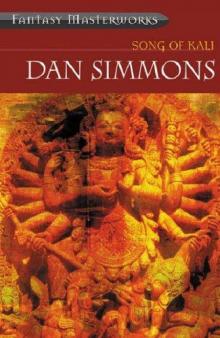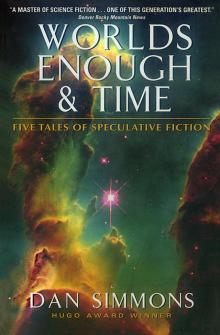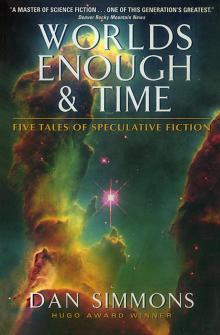- Home
- Dan Simmons
Phases of Gravity
Phases of Gravity Read online
Phases of Gravity
Dan Simmons
To Robert and Kathryn Simmons
Part One
Poona
Pan Am Flight 001 left the moonlight behind it and dropped into clouds and darkness as it felt its way toward a landing in New Delhi. Staring out at the port wing, Baedecker felt the weight pulling at him and mixing with the tension of an old pilot being forced to suffer a landing as a passenger. The wheels touched tarmac in an almost perfect touchdown and Baedecker glanced at his watch. It was 3:47 A.M. local time. Tiny motes of pain danced behind his eyes as he looked out past the flashing wingtip light at the dark silhouettes of water towers and service buildings moving past. The massive 747 swung sharply to the right and rolled to the end of its taxi run. The sound of engines swelled one final time and then dropped into silence, leaving Baedecker with the tired pounding of his own pulse in his ears. He had not slept for twenty-four hours.
Even before the shuffling line reached the forward exit, Baedecker felt the wave of heat and humidity strike him. Descending the ramp toward the sticky asphalt, he became aware of the tremendous mass of the planet under him, weighted even further by the hundreds of millions of wretched souls populating the subcontinent, and he hunched his shoulders against the inexorable pull of depression.
I should have done the credit card commercial, thought Baedecker. He stood in the gloom with the other passengers and waited for a blue-and-white jitney to approach them across the dark expanse of pavement. The terminal was a distant blur of lights on the horizon. Clouds reflected the rows of blinking lights beyond the runway.
It would not have been very difficult. All they had asked of him was to sit in front of the cameras and lights, smile, and say, "Do you know me? Sixteen years ago I walked on the moon. That doesn't help me though when I want to reserve an airline seat or pay for dinner in a French café." Two more lines of such drivel and then the standard closing with his name being punched out on the plastic card—RICHARD E. BAEDECKER.
The customs building was a huge, echoing warehouse of a place. Sodium yellow lights hung from metal rafters and made people's skin look greasy and waxlike. Baedecker's shirt was already plastered to his body in a dozen places. The lines moved slowly. Baedecker was used to the officiousness of customs officials, but these black-haired, brown-shirted little men seemed to be reaching for new heights of official unpleasantness. Three places in front of him in the line, an older Indian woman stood with her two daughters, all three in cheap cotton saris. Impatient with their replies, the agent behind the scratched counter dumped their two cheap suitcases on the floor of the shed. Brightly printed cloth, bras, and torn underpants spilled out in a heap. The customs man turned to another agent and said something in rapid Hindi that brought smirks to their faces.
Baedecker was almost dozing when he realized that one of the customs men was talking to him.
"Pardon me?"
"I said—is this all you have to declare? You are bringing in nothing else?" The singsong of Indian English seemed strangely familiar to Baedecker. He had encountered it with Indian hotel-management trainees around the world. Only then the tone was not edged with a strange suspiciousness and anger.
"Yes. That's all." Baedecker nodded toward the pink form they had filled out before landing.
"This is all you have? One bag?" The agent hefted Baedecker's old, black flight bag as if it held contraband or explosives.
"That's all."
The man scowled fiercely at the luggage and then passed it contemptuously to another brown-shirted agent farther along the counter. This man struck an X on the bag as if the violence of the motion would drive out whatever evils it held.
"Move along. Move along." The first agent was gesturing.
"Thank you," said Baedecker. He hefted the flight bag and moved out into the darkness beyond the customs shed.
The view had been one of blackness. Two black triangles. Not even the stars had been visible during their final descent. Standing in their bulky pressure suits, locked in position by an array of straps and stirrups, they could see only the featureless black sky. During most of its final burn and descent sequence, the landing module had been pitched back so that the lunar surface was invisible beneath them. Only during the final minutes did Baedecker have a chance to look out onto the glare and tumble of the moon's face.
It's just like the simulations, he'd thought. He knew even then that there should be more. He knew even as they were descending that he should be sensing more, feeling more. But as he automatically responded to Houston's updates and inquiries, obediently punched the appropriate numbers into the computer and read off figures to Dave, the same unworthy thought returned again and again. It's just like the simulations.
"Mr. Baedecker!" It took a minute for the shout to register. Someone was calling his name, had been for some time. Baedecker turned from where he was standing in the alley between the customs shed and the terminal and looked around. Thousands of bugs danced in the glare of the spotlights. People wrapped in white robes slept on the sidewalk, sat huddled against the dark buildings. Dark men in bright shirts leaned against black-and-yellow cabs. He turned the other way just as the girl caught up to him.
"Mr. Baedecker! Hello." She stopped with a graceful half step, threw her head back, paused to take a deep breath.
"Hello," said Baedecker. He had no idea who the young woman was but was haunted with a strong sense of déjà vu. Who in the world would be greeting him in New Delhi at four-thirty in the morning? Someone from the embassy? No, they didn't know he was coming and wouldn't care if they did. Not anymore. Bombay Electronics? Hardly. Not in New Delhi. And this young blonde was obviously American. Always poor at remembering names and faces, Baedecker felt the familiar flush of guilt and embarrassment. He ransacked his memory. Nothing.
"I'm Maggie Brown," said the girl and stuck her hand out. He shook it, surprised at how cool it felt. His own skin felt feverish even to himself. Maggie Brown? She brushed back a loose strand of her shoulder-length hair and again Baedecker was struck with a sense of having seen her before. He would go under the assumption that she worked with NASA, although she appeared too young to have . . .
"I'm Scott's friend," she said and smiled. She had a wide mouth and a slight gap between her front teeth. Somehow the effect was pleasant.
"Scott's friend. Of course. Hello." Baedecker shook her hand again. Looked around again. Several cabbies had come up to them and were proffering rides. He shook his head, but their babble only intensified. Baedecker took the girl's elbow and turned away from the gesticulating mob. "What are you doing here? In India, I mean. And here, too." Baedecker gestured lamely at the narrow street and the long shadow of the terminal. He remembered her now. Joan had shown him a picture of her the last time he had visited Boston. The green eyes had stuck in his memory.
"I've been here for three months," she said. "Scott rarely has time to see me, but I'm there if he does. In Poona, I mean. I found a job as governess . . . not really governess, I guess, but sort of a tutor . . . with this nice doctor's family there? In the old British section? Anyway, I was with Scott last week when he got your cable."
"Oh," said Baedecker. He could think of nothing else to say for several seconds. Overhead, a small jet climbed for altitude. "Is Scott here? I mean, I thought I'd see him in . . . what is it . . .? in Poona."
"Scott's at a retreat at the Master's farm. He won't be back until Tuesday. He asked me to tell you. Me, I'm visiting an old friend at the Education Foundation here in Old Delhi."
"The Master? You mean this guru of Scott's?"
"That's what they all call him. Anyway, Scott asked me to tell you, and I figured you wouldn't be staying long in New Delhi."
"You came out before dawn
to give me that message?" Baedecker looked carefully at the young woman next to him. As they moved farther away from the glaring spotlights, her skin seemed to glow of its own accord. He realized that soft light was tinging the eastern sky.
"No problem," she said and took his arm in hers. "My train just got in a few hours ago. I didn't have anything to do until the USEFI offices opened up."
They had come around to the front of the terminal. Baedecker realized that they were out in the country, some distance from the city. He could see high-rise apartments in the distance, but the sounds and smells surrounding them were all of the country. The curving airport drive led to a wide highway, but nearby were dirt roads under multitrunked banyan trees.
"When's your flight, Mr. Baedecker?"
"To Bombay? Not until eight-thirty. Call me Richard."
"Okay, Richard. What do you say we take a walk and then get some breakfast?"
"Fine," said Baedecker. He would have given anything at that moment to have an empty room waiting for him, a bed, time to sleep. What time would it be in St. Louis? His tired mind was not up to the simple arithmetic. He followed the girl as she set off down the rain-moistened drive. Ahead of them the sun was rising.
The sun had been rising for three days when they landed. Details stood out in bold relief. It had been planned that way.
Later, Baedecker remembered very little about actually descending the ladder and stepping off the LM footpad. All those years of preparation, simulation, and expectation had led to that single point, that sharp intersection of time and place, but what Baedecker later remembered was the vague sense of frustration and urgency. They were twenty-three minutes behind schedule when Dave finally led the way down the ladder. Suiting up, going over the fifty-one-point PLS checklist, and depressurizing had taken more time than it had in the simulations.
Then they were moving across the surface, testing their balance, picking up contingency samples, and trying to make up for lost time. Baedecker had spent many hours composing a short phrase to recite upon first setting foot on lunar soil—his "footnote in history" as Joan had called it—but Dave made a joke after jumping off the footpad, Houston had asked for a radio check, and the moment passed.
Baedecker had two strong memories of the rest of that first EVA. He remembered the damned checklist banded to his wrist. They never caught up to the timeline, not even after eliminating the third core sample and the second check of the Rover's guidance memory. He had hated that checklist.
The other memory still returned to him in dreams. The gravity. The one-sixth gee. The sheer exhilaration of bouncing across the glaring, rock-strewn surface with only the lightest touch of their boots to propel them. It awakened an even earlier memory in Baedecker; he was a child, learning to swim in Lake Michigan, and his father was holding him under the arms while he kicked and bounced his way across the sand of the lake bottom. What marvelous lightness, the supporting strength of his father's arms, the gentle rise and fall of the green waves, the perfect synchronization of weight and buoyancy meeting in the ribbon of balance flowing up from the balls of his feet.
He still dreamed about that.
The sun rose like a great, orange balloon, its sides shifting laterally as light refracted through the warming air. Baedecker thought of Ektachrome photos in National Geographic. India! Insects, birds, goats, chickens, and cattle added to the growing sound of traffic along the unseen highway. Even this winding dirt road on which they walked was already crowded with people on bicycles, bullock carts, heavy trucks labeled Public Transport, and an occasional black-and-yellow taxi dodging in and out of the confusion like an angry bee.
Baedecker and the girl stopped by a small, green building that was either a farmhouse or a Hindu temple. Perhaps it was both. Bells were ringing inside. The smell of incense and manure drifted from an inner courtyard. Roosters were crowing and somewhere a man was chanting in a frail-voiced falsetto. Another man—this one in a blue polyester business suit—stopped his bicycle, stepped to the side of the road, and urinated into the temple yard.
A bullock cart lumbered past, axle grinding, yoke straining, and Baedecker turned to watch it. A woman in the back of it lifted her sari to her face, but the three children next to her returned Baedecker's stare. The man in front shouted at the laboring bullock and snapped a long stick against a flank already scabrous with sores. Suddenly all other noises were lost as an Air India 747 roared overhead, its metal sides catching the gold of the rising sun.
"What's that smell?" asked Baedecker. Above the general onslaught of odors—wet soil, open sewage, car exhausts, compost heaps, pollution from the unseen city—there rose a sweet, overpowering scent that already seemed to have permeated his skin and clothes.
"They're cooking breakfast," said Maggie Brown. "All over the country, they're cooking breakfast over open fires. Most of them using dried cow dung as fuel. Eight hundred million people cooking breakfast. Gandhi once wrote that that was the eternal scent of India."
Baedecker nodded. The sunrise was being swallowed by lowering monsoon clouds. For a second the trees and grass were a brilliant, false green, made even more pronounced by Baedecker's fatigue. The headache, which had been with him since Frankfurt, had moved from behind his eyes to a point at the base of his neck. Every step sent an echo of pain through his head. Yet the pain seemed a distant and unimportant thing, perceived as it was through a haze of exhaustion and jet lag. It was part of the strangeness—the new smells, the odd cacophony of rural and urban sounds, this attractive young woman at his side with sunlight outlining her cheekbones and setting fire to her green eyes. What was she to his son anyway? How serious was their relationship? Baedecker wished he had asked Joan more questions about the girl, but the visit had been uncomfortable and he had been in a hurry to leave.
Baedecker looked at Maggie Brown and realized that he was being sexist in thinking of her as a girl. The young woman seemed to possess that sense of self-possession, of awareness, which Baedecker associated with true adults as opposed to those who had simply grown up. Looking again, Baedecker guessed that Maggie Brown was at least in her mid-twenties, several years older than Scott. Hadn't Joan said something about their son's friend being a graduate student and teaching assistant?
"Did you come to India just to visit Scott?" asked Maggie Brown. They were on the circular drive again, approaching the airport.
"Yes. No," said Baedecker. "That is, I came to see Scott, but I arranged a business trip to coincide with it."
"Don't you work for the government?" asked Maggie. "The space people?"
Baedecker smiled at the image "the space people" evoked. "Not for the past twelve years," he said and told her about the aerospace firm in St. Louis for which he worked.
"So you don't have anything to do with the space shuttle?" said Maggie.
"Not really. We had some subsystems aboard the shuttles and used to rent payload space aboard them every once in a while." Baedecker was aware that he had used the past tense, as if he were speaking about someone who had died.
Maggie stopped to watch the rich sunlight bathe the sides of the New Delhi control tower and terminal buildings in gold. She tucked a wayward strand of hair behind one ear and folded her arms. "It's hard to believe that it's been almost eighteen months since the Challenger explosion," she said. "That was a terrible thing."
"Yes," said Baedecker.
It was ironic that he had been at the Cape for that flight. He had been present for only one previous shuttle launch, one of the Columbia's first engineering flights almost five years earlier. He was there in January of 1986 for the Challenger disaster only because Cole Prescott, the vice president of Baedecker's firm, had asked him to escort a client who had bankrolled a subcomponent in the Spartan-Halley experiment package sitting in the Challenger's payload bay.
The launch of 51-L had seemed nominal enough and Baedecker and his client were standing in the VIP stands three miles from Pad 39-B, shielding their eyes against the late-morning sun, when
things went bad. Baedecker could remember marveling at how cold it was; he had brought only a light cotton jacket, and the morning had been the coldest he could ever recall at the Cape. Through binoculars, he had caught a glint of ice on the gantries surrounding the shuttle.
Baedecker remembered that he had been thinking about getting an early start to beat the leaving crowds when the loudspeaker carried the voice of NASA's public affairs officer. "Altitude four point three nautical miles, down-range distance three nautical miles. Engines throttling up. Three engines now at one hundred four percent."
He had thought fleetingly of his own launch fifteen years before, of his job relaying data while Dave Muldorff "flew" the monstrous Saturn V, until he was returned to the present as the loudspeaker carried Commander Dick Scobee's voice saying, "Roger, go at throttle up," and Baedecker had glanced toward the parking lots to see how congested the roads would be and a second later his client had said, "Wow, those SRBs really create a cloud when they separate, don't they?"
Baedecker had looked up then, seen the expanding, mushrooming contrail that had nothing to do with SRB separation, and instantly had recognized the sickening orange-red glow that lit the interior of the cloud as hypergolic fuels ignited on contact as they escaped from the shuttle's destroyed reaction control system and orbital maneuvering engines. A few seconds later the solid rocket boosters became visible as they careened mindlessly from the still-expanding cumulus of the explosion. Feeling sick to his stomach, Baedecker had turned to Tucker Wilson, a fellow Apollo-era pilot who was still on active duty with NASA, and had said without any real hope, "RTLS?"
Tucker had shaken his head; this was no return to launch site abort. This was what each of them had silently waited for during their own minutes of launch. By the time Baedecker had looked up again, the first large segments of the destroyed orbiter had begun their long, sad fall to the waiting crypt of the sea.
In the months since Challenger, Baedecker had found it hard to believe that the country had ever flown so frequently and competently into space. The long hiatus of earthbound doubt in which nothing flew had become the normal state of things to Baedecker, mixing in his own mind with a dreary sense of heaviness, of entropy and gravity triumphant, which had weighed upon him since his own world and family had been blasted apart some months earlier.

 The Terror
The Terror Endymion
Endymion Hyperion
Hyperion The Crook Factory
The Crook Factory Ilium
Ilium Phases of Gravity
Phases of Gravity Hardcase
Hardcase Fires of Eden
Fires of Eden Children of the Night
Children of the Night Muse of Fire
Muse of Fire Drood
Drood The Fifth Heart
The Fifth Heart Carrion Comfort
Carrion Comfort The Hollow Man
The Hollow Man Summer of Night
Summer of Night The Fall of Hyperion
The Fall of Hyperion Black Hills
Black Hills A Winter Haunting
A Winter Haunting Hard Freeze
Hard Freeze Prayers to Broken Stones
Prayers to Broken Stones Hard as Nails
Hard as Nails The Guiding Nose of Ulfant Banderoz
The Guiding Nose of Ulfant Banderoz The Rise of Endymion
The Rise of Endymion Orphans of the Helix
Orphans of the Helix Lovedeath
Lovedeath Olympos
Olympos Darwin's Blade
Darwin's Blade Song of Kali
Song of Kali Worlds Enough & Time: Five Tales of Speculative Fiction
Worlds Enough & Time: Five Tales of Speculative Fiction The Abominable
The Abominable The Death of the Centaur
The Death of the Centaur Hard as Nails jk-3
Hard as Nails jk-3 Worlds Enough & Time
Worlds Enough & Time Joe Kurtz Omnibus
Joe Kurtz Omnibus The Hyperion Cantos 4-Book Bundle
The Hyperion Cantos 4-Book Bundle Rise of Endymion
Rise of Endymion Hard Freeze jk-2
Hard Freeze jk-2 Olympos t-2
Olympos t-2 The Abominable: A Novel
The Abominable: A Novel Hyperion h-1
Hyperion h-1 Remembering Siri
Remembering Siri Black Hills: A Novel
Black Hills: A Novel Ilium t-1
Ilium t-1 Hardcase jk-1
Hardcase jk-1 Hyperion 01 - Hyperion
Hyperion 01 - Hyperion